BCTA 156: A Case Study Analysis of Ontario's Highway Traffic Act
VerifiedAdded on 2023/05/30
|9
|1922
|339
Case Study
AI Summary
This case study analyzes a scenario where Amanda receives a ticket for violating Section 78.1(1) of the Highway Traffic Act of Ontario for holding a cell phone while driving. The analysis explores the legal issue of whether Amanda can fight the ticket, considering Ontario's ban on hand-held devices while driving. It examines relevant legislation, including the Highway Traffic Act R.S.O. 1990, c. H.8, and case law such as R. v. Kazemi, R. v. Pizzurro, and R. v. Fabian. The discussion delves into the interpretation of 'holding' a device, the intent of the legislation to prevent distracted driving, and the potential penalties. Ultimately, the case study concludes that Amanda is likely liable for violating the Act, as holding the phone, even if non-operable, constitutes distracted driving and disrupts the objectives of the law. The research methodology involved analyzing the case scenario, identifying the legal issue, researching relevant laws and cases, and applying the case decisions to the scenario to reach a conclusion.
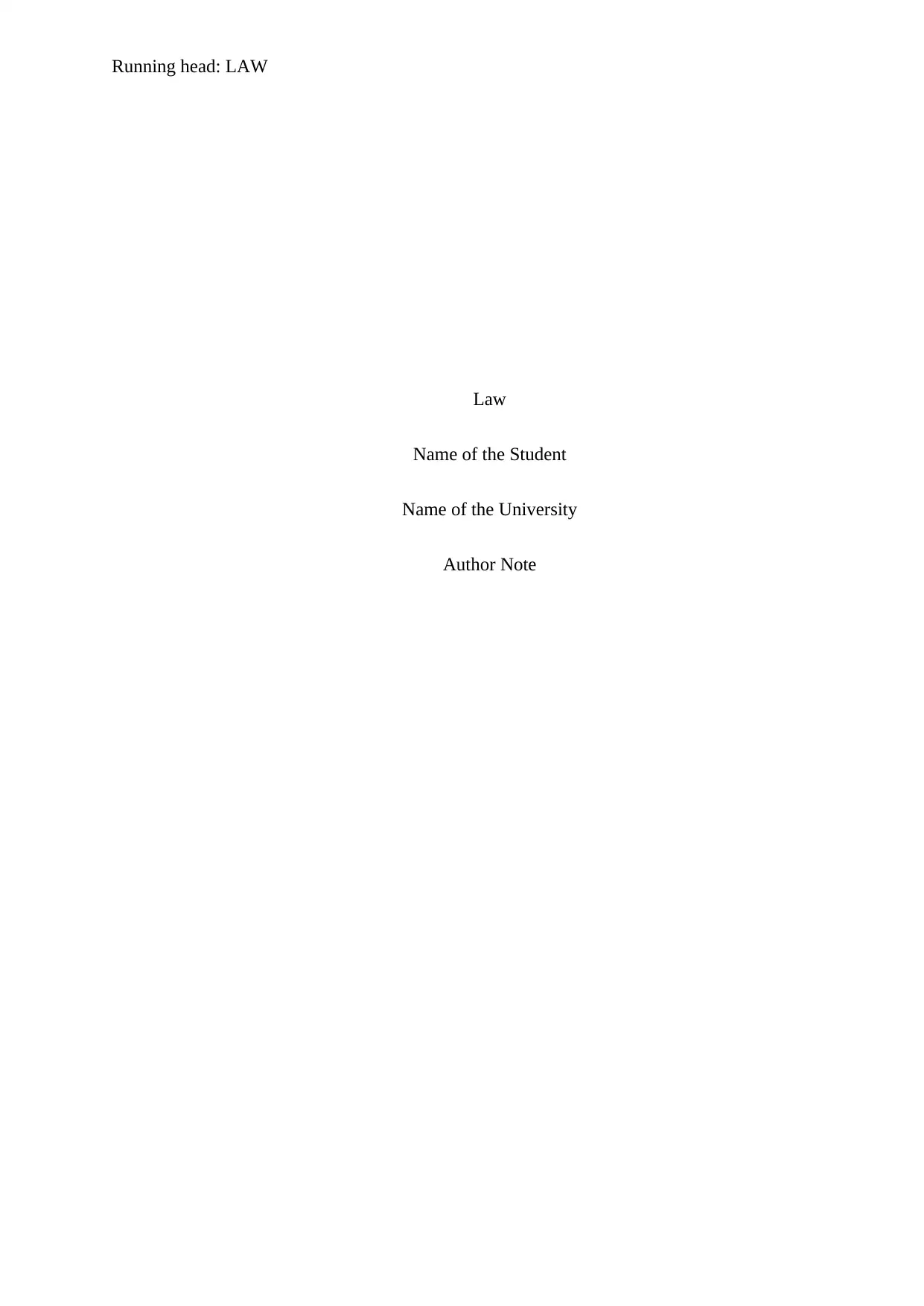
Running head: LAW
Law
Name of the Student
Name of the University
Author Note
Law
Name of the Student
Name of the University
Author Note
Paraphrase This Document
Need a fresh take? Get an instant paraphrase of this document with our AI Paraphraser
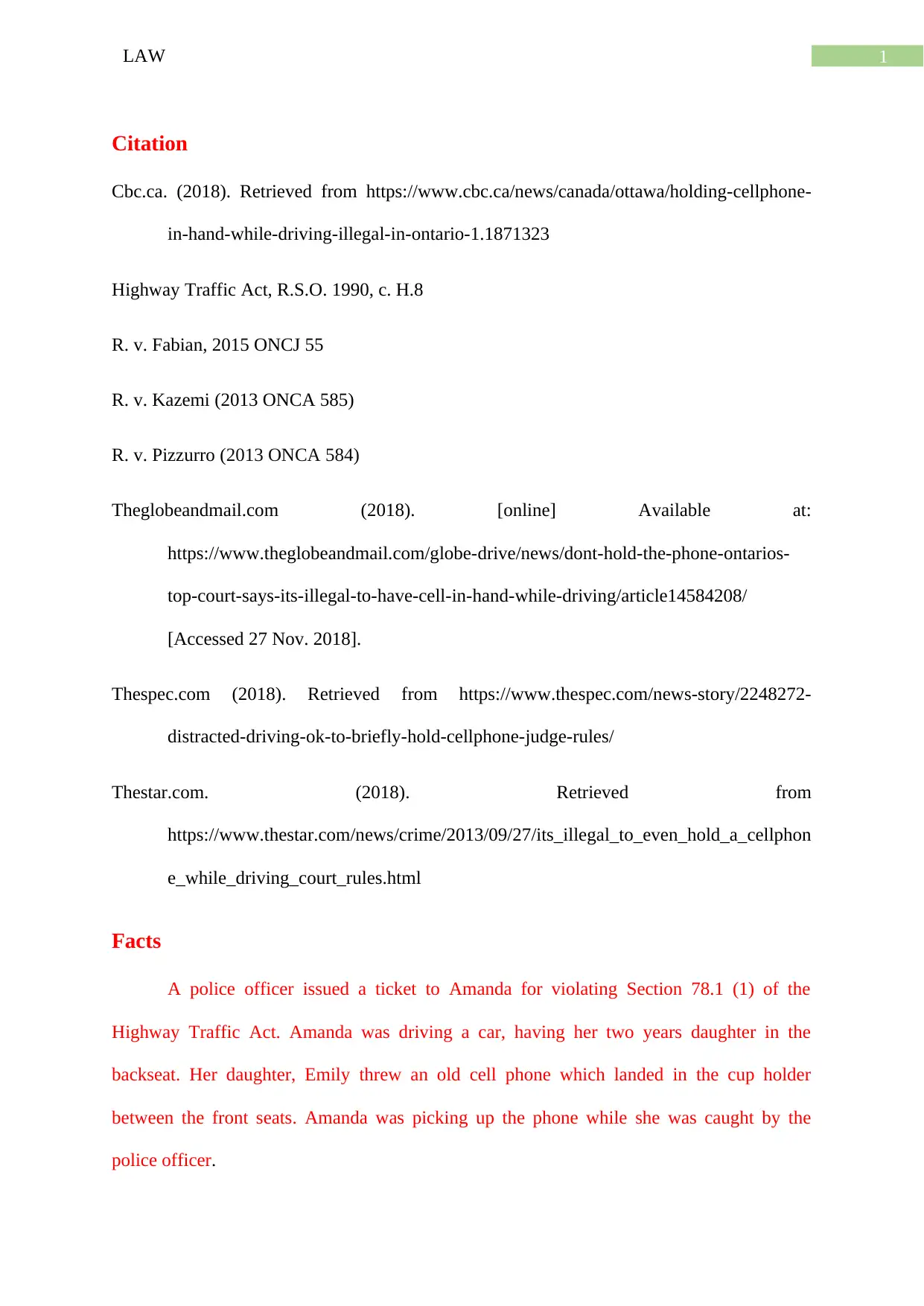
1LAW
Citation
Cbc.ca. (2018). Retrieved from https://www.cbc.ca/news/canada/ottawa/holding-cellphone-
in-hand-while-driving-illegal-in-ontario-1.1871323
Highway Traffic Act, R.S.O. 1990, c. H.8
R. v. Fabian, 2015 ONCJ 55
R. v. Kazemi (2013 ONCA 585)
R. v. Pizzurro (2013 ONCA 584)
Theglobeandmail.com (2018). [online] Available at:
https://www.theglobeandmail.com/globe-drive/news/dont-hold-the-phone-ontarios-
top-court-says-its-illegal-to-have-cell-in-hand-while-driving/article14584208/
[Accessed 27 Nov. 2018].
Thespec.com (2018). Retrieved from https://www.thespec.com/news-story/2248272-
distracted-driving-ok-to-briefly-hold-cellphone-judge-rules/
Thestar.com. (2018). Retrieved from
https://www.thestar.com/news/crime/2013/09/27/its_illegal_to_even_hold_a_cellphon
e_while_driving_court_rules.html
Facts
A police officer issued a ticket to Amanda for violating Section 78.1 (1) of the
Highway Traffic Act. Amanda was driving a car, having her two years daughter in the
backseat. Her daughter, Emily threw an old cell phone which landed in the cup holder
between the front seats. Amanda was picking up the phone while she was caught by the
police officer.
Citation
Cbc.ca. (2018). Retrieved from https://www.cbc.ca/news/canada/ottawa/holding-cellphone-
in-hand-while-driving-illegal-in-ontario-1.1871323
Highway Traffic Act, R.S.O. 1990, c. H.8
R. v. Fabian, 2015 ONCJ 55
R. v. Kazemi (2013 ONCA 585)
R. v. Pizzurro (2013 ONCA 584)
Theglobeandmail.com (2018). [online] Available at:
https://www.theglobeandmail.com/globe-drive/news/dont-hold-the-phone-ontarios-
top-court-says-its-illegal-to-have-cell-in-hand-while-driving/article14584208/
[Accessed 27 Nov. 2018].
Thespec.com (2018). Retrieved from https://www.thespec.com/news-story/2248272-
distracted-driving-ok-to-briefly-hold-cellphone-judge-rules/
Thestar.com. (2018). Retrieved from
https://www.thestar.com/news/crime/2013/09/27/its_illegal_to_even_hold_a_cellphon
e_while_driving_court_rules.html
Facts
A police officer issued a ticket to Amanda for violating Section 78.1 (1) of the
Highway Traffic Act. Amanda was driving a car, having her two years daughter in the
backseat. Her daughter, Emily threw an old cell phone which landed in the cup holder
between the front seats. Amanda was picking up the phone while she was caught by the
police officer.
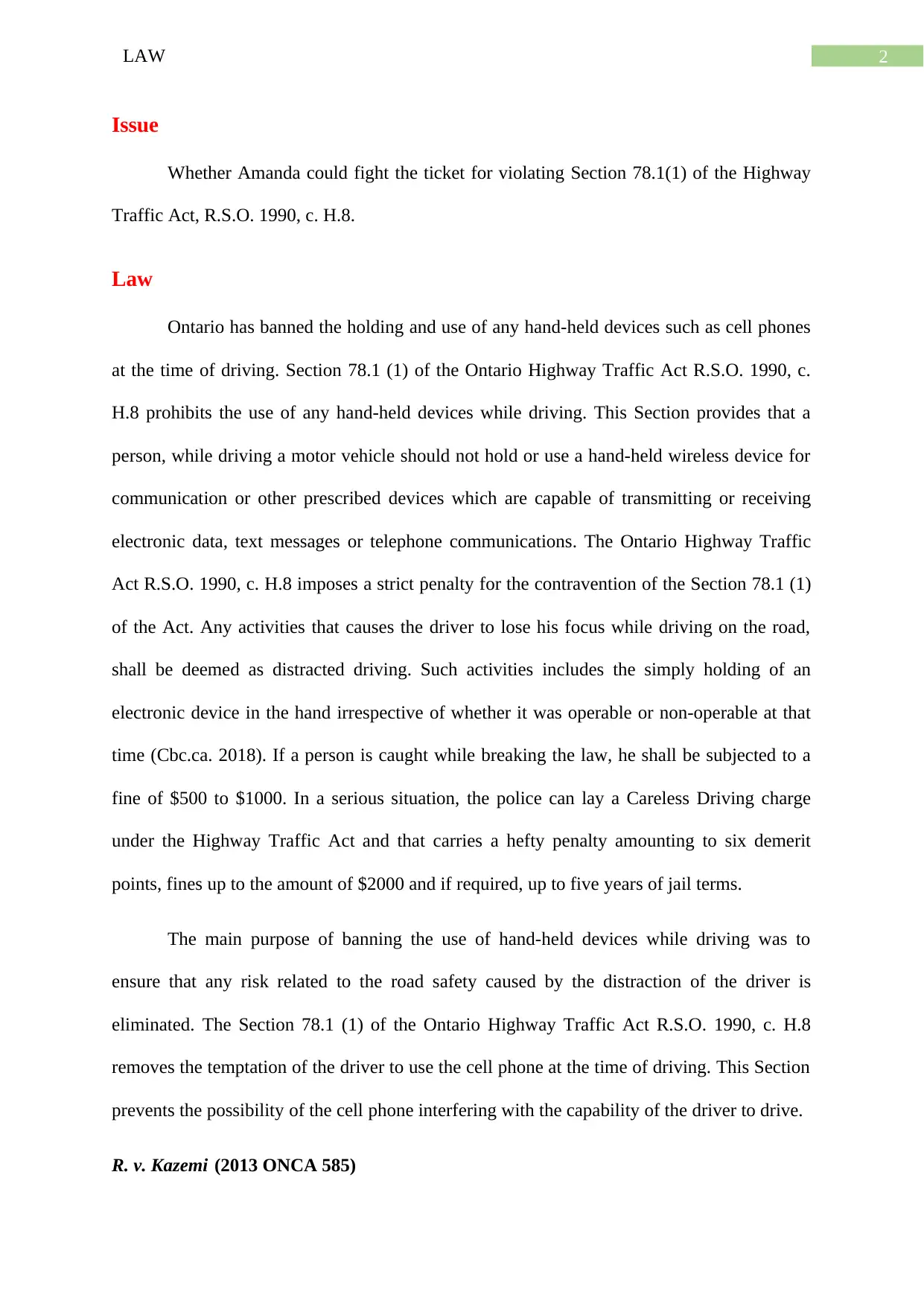
2LAW
Issue
Whether Amanda could fight the ticket for violating Section 78.1(1) of the Highway
Traffic Act, R.S.O. 1990, c. H.8.
Law
Ontario has banned the holding and use of any hand-held devices such as cell phones
at the time of driving. Section 78.1 (1) of the Ontario Highway Traffic Act R.S.O. 1990, c.
H.8 prohibits the use of any hand-held devices while driving. This Section provides that a
person, while driving a motor vehicle should not hold or use a hand-held wireless device for
communication or other prescribed devices which are capable of transmitting or receiving
electronic data, text messages or telephone communications. The Ontario Highway Traffic
Act R.S.O. 1990, c. H.8 imposes a strict penalty for the contravention of the Section 78.1 (1)
of the Act. Any activities that causes the driver to lose his focus while driving on the road,
shall be deemed as distracted driving. Such activities includes the simply holding of an
electronic device in the hand irrespective of whether it was operable or non-operable at that
time (Cbc.ca. 2018). If a person is caught while breaking the law, he shall be subjected to a
fine of $500 to $1000. In a serious situation, the police can lay a Careless Driving charge
under the Highway Traffic Act and that carries a hefty penalty amounting to six demerit
points, fines up to the amount of $2000 and if required, up to five years of jail terms.
The main purpose of banning the use of hand-held devices while driving was to
ensure that any risk related to the road safety caused by the distraction of the driver is
eliminated. The Section 78.1 (1) of the Ontario Highway Traffic Act R.S.O. 1990, c. H.8
removes the temptation of the driver to use the cell phone at the time of driving. This Section
prevents the possibility of the cell phone interfering with the capability of the driver to drive.
R. v. Kazemi (2013 ONCA 585)
Issue
Whether Amanda could fight the ticket for violating Section 78.1(1) of the Highway
Traffic Act, R.S.O. 1990, c. H.8.
Law
Ontario has banned the holding and use of any hand-held devices such as cell phones
at the time of driving. Section 78.1 (1) of the Ontario Highway Traffic Act R.S.O. 1990, c.
H.8 prohibits the use of any hand-held devices while driving. This Section provides that a
person, while driving a motor vehicle should not hold or use a hand-held wireless device for
communication or other prescribed devices which are capable of transmitting or receiving
electronic data, text messages or telephone communications. The Ontario Highway Traffic
Act R.S.O. 1990, c. H.8 imposes a strict penalty for the contravention of the Section 78.1 (1)
of the Act. Any activities that causes the driver to lose his focus while driving on the road,
shall be deemed as distracted driving. Such activities includes the simply holding of an
electronic device in the hand irrespective of whether it was operable or non-operable at that
time (Cbc.ca. 2018). If a person is caught while breaking the law, he shall be subjected to a
fine of $500 to $1000. In a serious situation, the police can lay a Careless Driving charge
under the Highway Traffic Act and that carries a hefty penalty amounting to six demerit
points, fines up to the amount of $2000 and if required, up to five years of jail terms.
The main purpose of banning the use of hand-held devices while driving was to
ensure that any risk related to the road safety caused by the distraction of the driver is
eliminated. The Section 78.1 (1) of the Ontario Highway Traffic Act R.S.O. 1990, c. H.8
removes the temptation of the driver to use the cell phone at the time of driving. This Section
prevents the possibility of the cell phone interfering with the capability of the driver to drive.
R. v. Kazemi (2013 ONCA 585)
⊘ This is a preview!⊘
Do you want full access?
Subscribe today to unlock all pages.

Trusted by 1+ million students worldwide
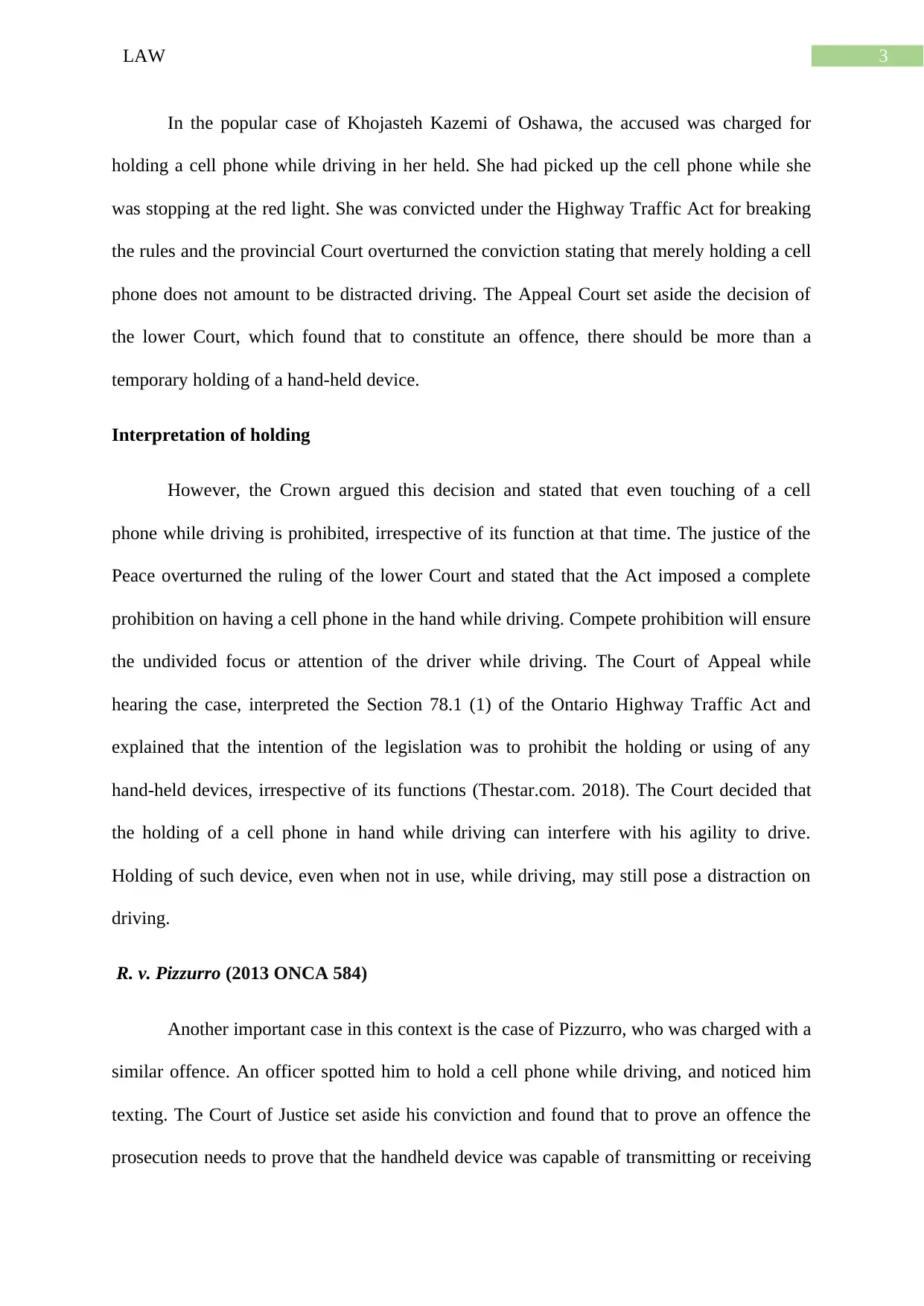
3LAW
In the popular case of Khojasteh Kazemi of Oshawa, the accused was charged for
holding a cell phone while driving in her held. She had picked up the cell phone while she
was stopping at the red light. She was convicted under the Highway Traffic Act for breaking
the rules and the provincial Court overturned the conviction stating that merely holding a cell
phone does not amount to be distracted driving. The Appeal Court set aside the decision of
the lower Court, which found that to constitute an offence, there should be more than a
temporary holding of a hand-held device.
Interpretation of holding
However, the Crown argued this decision and stated that even touching of a cell
phone while driving is prohibited, irrespective of its function at that time. The justice of the
Peace overturned the ruling of the lower Court and stated that the Act imposed a complete
prohibition on having a cell phone in the hand while driving. Compete prohibition will ensure
the undivided focus or attention of the driver while driving. The Court of Appeal while
hearing the case, interpreted the Section 78.1 (1) of the Ontario Highway Traffic Act and
explained that the intention of the legislation was to prohibit the holding or using of any
hand-held devices, irrespective of its functions (Thestar.com. 2018). The Court decided that
the holding of a cell phone in hand while driving can interfere with his agility to drive.
Holding of such device, even when not in use, while driving, may still pose a distraction on
driving.
R. v. Pizzurro (2013 ONCA 584)
Another important case in this context is the case of Pizzurro, who was charged with a
similar offence. An officer spotted him to hold a cell phone while driving, and noticed him
texting. The Court of Justice set aside his conviction and found that to prove an offence the
prosecution needs to prove that the handheld device was capable of transmitting or receiving
In the popular case of Khojasteh Kazemi of Oshawa, the accused was charged for
holding a cell phone while driving in her held. She had picked up the cell phone while she
was stopping at the red light. She was convicted under the Highway Traffic Act for breaking
the rules and the provincial Court overturned the conviction stating that merely holding a cell
phone does not amount to be distracted driving. The Appeal Court set aside the decision of
the lower Court, which found that to constitute an offence, there should be more than a
temporary holding of a hand-held device.
Interpretation of holding
However, the Crown argued this decision and stated that even touching of a cell
phone while driving is prohibited, irrespective of its function at that time. The justice of the
Peace overturned the ruling of the lower Court and stated that the Act imposed a complete
prohibition on having a cell phone in the hand while driving. Compete prohibition will ensure
the undivided focus or attention of the driver while driving. The Court of Appeal while
hearing the case, interpreted the Section 78.1 (1) of the Ontario Highway Traffic Act and
explained that the intention of the legislation was to prohibit the holding or using of any
hand-held devices, irrespective of its functions (Thestar.com. 2018). The Court decided that
the holding of a cell phone in hand while driving can interfere with his agility to drive.
Holding of such device, even when not in use, while driving, may still pose a distraction on
driving.
R. v. Pizzurro (2013 ONCA 584)
Another important case in this context is the case of Pizzurro, who was charged with a
similar offence. An officer spotted him to hold a cell phone while driving, and noticed him
texting. The Court of Justice set aside his conviction and found that to prove an offence the
prosecution needs to prove that the handheld device was capable of transmitting or receiving
Paraphrase This Document
Need a fresh take? Get an instant paraphrase of this document with our AI Paraphraser
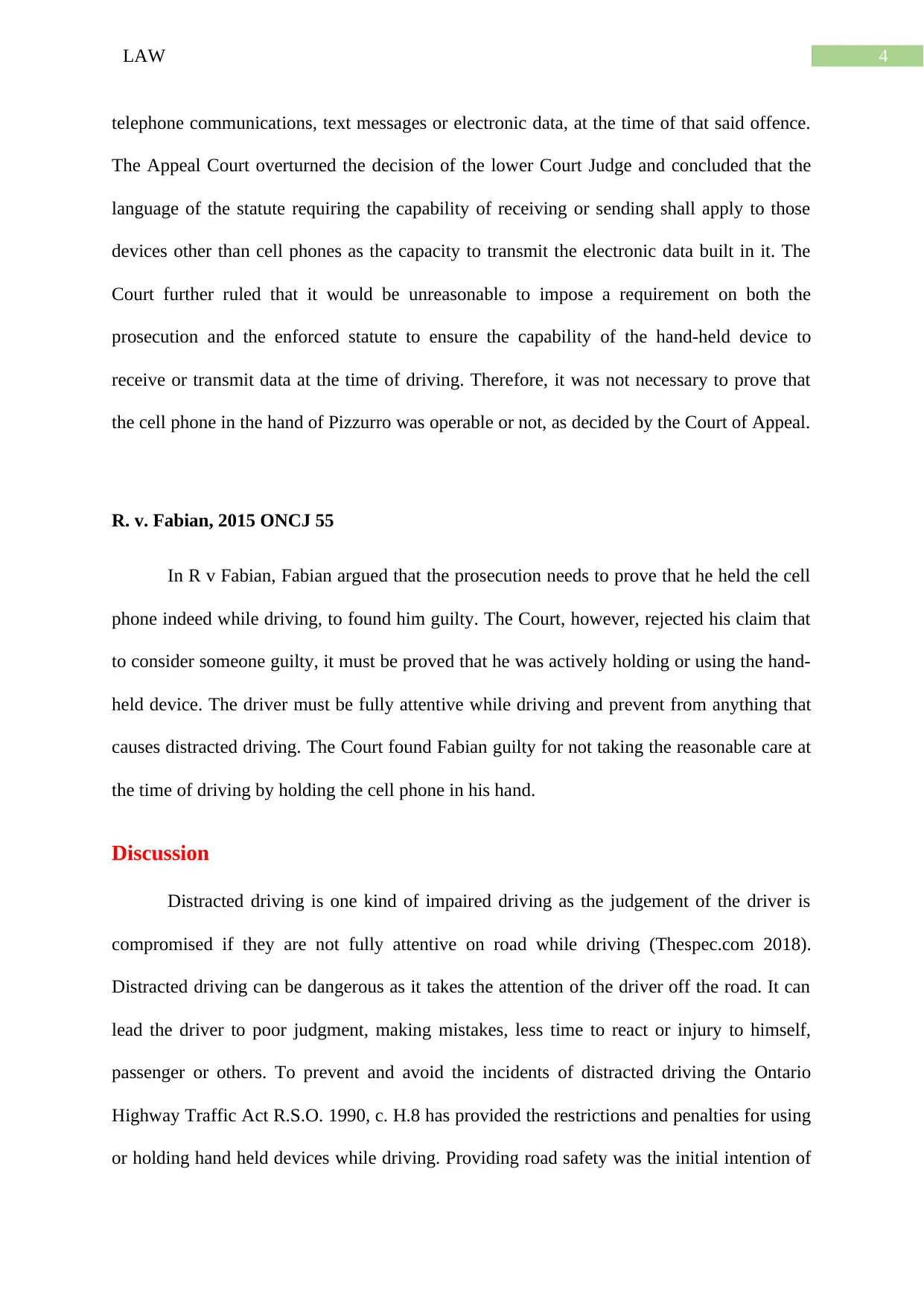
4LAW
telephone communications, text messages or electronic data, at the time of that said offence.
The Appeal Court overturned the decision of the lower Court Judge and concluded that the
language of the statute requiring the capability of receiving or sending shall apply to those
devices other than cell phones as the capacity to transmit the electronic data built in it. The
Court further ruled that it would be unreasonable to impose a requirement on both the
prosecution and the enforced statute to ensure the capability of the hand-held device to
receive or transmit data at the time of driving. Therefore, it was not necessary to prove that
the cell phone in the hand of Pizzurro was operable or not, as decided by the Court of Appeal.
R. v. Fabian, 2015 ONCJ 55
In R v Fabian, Fabian argued that the prosecution needs to prove that he held the cell
phone indeed while driving, to found him guilty. The Court, however, rejected his claim that
to consider someone guilty, it must be proved that he was actively holding or using the hand-
held device. The driver must be fully attentive while driving and prevent from anything that
causes distracted driving. The Court found Fabian guilty for not taking the reasonable care at
the time of driving by holding the cell phone in his hand.
Discussion
Distracted driving is one kind of impaired driving as the judgement of the driver is
compromised if they are not fully attentive on road while driving (Thespec.com 2018).
Distracted driving can be dangerous as it takes the attention of the driver off the road. It can
lead the driver to poor judgment, making mistakes, less time to react or injury to himself,
passenger or others. To prevent and avoid the incidents of distracted driving the Ontario
Highway Traffic Act R.S.O. 1990, c. H.8 has provided the restrictions and penalties for using
or holding hand held devices while driving. Providing road safety was the initial intention of
telephone communications, text messages or electronic data, at the time of that said offence.
The Appeal Court overturned the decision of the lower Court Judge and concluded that the
language of the statute requiring the capability of receiving or sending shall apply to those
devices other than cell phones as the capacity to transmit the electronic data built in it. The
Court further ruled that it would be unreasonable to impose a requirement on both the
prosecution and the enforced statute to ensure the capability of the hand-held device to
receive or transmit data at the time of driving. Therefore, it was not necessary to prove that
the cell phone in the hand of Pizzurro was operable or not, as decided by the Court of Appeal.
R. v. Fabian, 2015 ONCJ 55
In R v Fabian, Fabian argued that the prosecution needs to prove that he held the cell
phone indeed while driving, to found him guilty. The Court, however, rejected his claim that
to consider someone guilty, it must be proved that he was actively holding or using the hand-
held device. The driver must be fully attentive while driving and prevent from anything that
causes distracted driving. The Court found Fabian guilty for not taking the reasonable care at
the time of driving by holding the cell phone in his hand.
Discussion
Distracted driving is one kind of impaired driving as the judgement of the driver is
compromised if they are not fully attentive on road while driving (Thespec.com 2018).
Distracted driving can be dangerous as it takes the attention of the driver off the road. It can
lead the driver to poor judgment, making mistakes, less time to react or injury to himself,
passenger or others. To prevent and avoid the incidents of distracted driving the Ontario
Highway Traffic Act R.S.O. 1990, c. H.8 has provided the restrictions and penalties for using
or holding hand held devices while driving. Providing road safety was the initial intention of
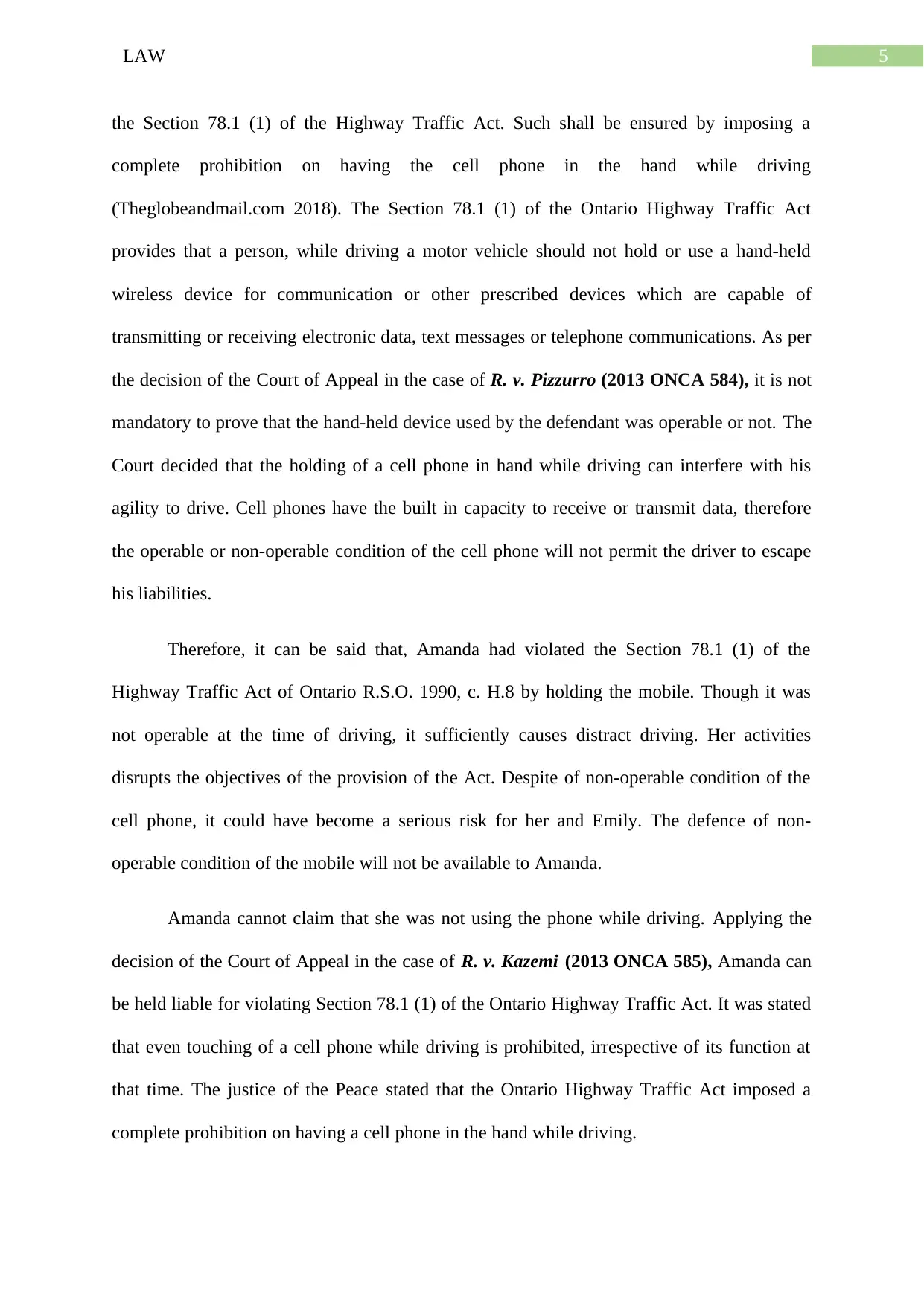
5LAW
the Section 78.1 (1) of the Highway Traffic Act. Such shall be ensured by imposing a
complete prohibition on having the cell phone in the hand while driving
(Theglobeandmail.com 2018). The Section 78.1 (1) of the Ontario Highway Traffic Act
provides that a person, while driving a motor vehicle should not hold or use a hand-held
wireless device for communication or other prescribed devices which are capable of
transmitting or receiving electronic data, text messages or telephone communications. As per
the decision of the Court of Appeal in the case of R. v. Pizzurro (2013 ONCA 584), it is not
mandatory to prove that the hand-held device used by the defendant was operable or not. The
Court decided that the holding of a cell phone in hand while driving can interfere with his
agility to drive. Cell phones have the built in capacity to receive or transmit data, therefore
the operable or non-operable condition of the cell phone will not permit the driver to escape
his liabilities.
Therefore, it can be said that, Amanda had violated the Section 78.1 (1) of the
Highway Traffic Act of Ontario R.S.O. 1990, c. H.8 by holding the mobile. Though it was
not operable at the time of driving, it sufficiently causes distract driving. Her activities
disrupts the objectives of the provision of the Act. Despite of non-operable condition of the
cell phone, it could have become a serious risk for her and Emily. The defence of non-
operable condition of the mobile will not be available to Amanda.
Amanda cannot claim that she was not using the phone while driving. Applying the
decision of the Court of Appeal in the case of R. v. Kazemi (2013 ONCA 585), Amanda can
be held liable for violating Section 78.1 (1) of the Ontario Highway Traffic Act. It was stated
that even touching of a cell phone while driving is prohibited, irrespective of its function at
that time. The justice of the Peace stated that the Ontario Highway Traffic Act imposed a
complete prohibition on having a cell phone in the hand while driving.
the Section 78.1 (1) of the Highway Traffic Act. Such shall be ensured by imposing a
complete prohibition on having the cell phone in the hand while driving
(Theglobeandmail.com 2018). The Section 78.1 (1) of the Ontario Highway Traffic Act
provides that a person, while driving a motor vehicle should not hold or use a hand-held
wireless device for communication or other prescribed devices which are capable of
transmitting or receiving electronic data, text messages or telephone communications. As per
the decision of the Court of Appeal in the case of R. v. Pizzurro (2013 ONCA 584), it is not
mandatory to prove that the hand-held device used by the defendant was operable or not. The
Court decided that the holding of a cell phone in hand while driving can interfere with his
agility to drive. Cell phones have the built in capacity to receive or transmit data, therefore
the operable or non-operable condition of the cell phone will not permit the driver to escape
his liabilities.
Therefore, it can be said that, Amanda had violated the Section 78.1 (1) of the
Highway Traffic Act of Ontario R.S.O. 1990, c. H.8 by holding the mobile. Though it was
not operable at the time of driving, it sufficiently causes distract driving. Her activities
disrupts the objectives of the provision of the Act. Despite of non-operable condition of the
cell phone, it could have become a serious risk for her and Emily. The defence of non-
operable condition of the mobile will not be available to Amanda.
Amanda cannot claim that she was not using the phone while driving. Applying the
decision of the Court of Appeal in the case of R. v. Kazemi (2013 ONCA 585), Amanda can
be held liable for violating Section 78.1 (1) of the Ontario Highway Traffic Act. It was stated
that even touching of a cell phone while driving is prohibited, irrespective of its function at
that time. The justice of the Peace stated that the Ontario Highway Traffic Act imposed a
complete prohibition on having a cell phone in the hand while driving.
⊘ This is a preview!⊘
Do you want full access?
Subscribe today to unlock all pages.

Trusted by 1+ million students worldwide
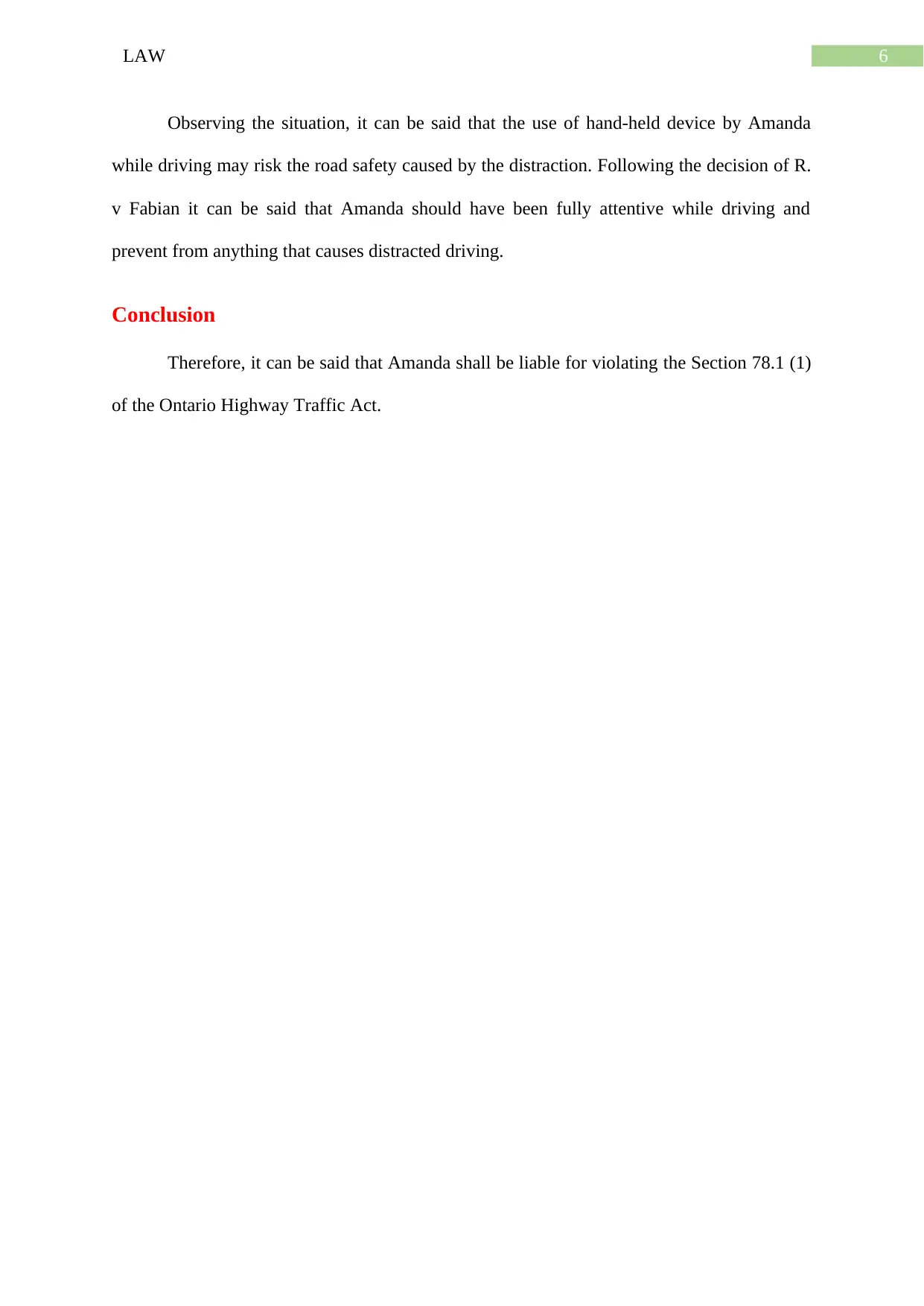
6LAW
Observing the situation, it can be said that the use of hand-held device by Amanda
while driving may risk the road safety caused by the distraction. Following the decision of R.
v Fabian it can be said that Amanda should have been fully attentive while driving and
prevent from anything that causes distracted driving.
Conclusion
Therefore, it can be said that Amanda shall be liable for violating the Section 78.1 (1)
of the Ontario Highway Traffic Act.
Observing the situation, it can be said that the use of hand-held device by Amanda
while driving may risk the road safety caused by the distraction. Following the decision of R.
v Fabian it can be said that Amanda should have been fully attentive while driving and
prevent from anything that causes distracted driving.
Conclusion
Therefore, it can be said that Amanda shall be liable for violating the Section 78.1 (1)
of the Ontario Highway Traffic Act.
Paraphrase This Document
Need a fresh take? Get an instant paraphrase of this document with our AI Paraphraser

7LAW
Research Methodology
To address the issue, firstly the scenario of the case study was thoroughly analysed.
Observing the situation the legal issue involved in this case was identified. With the help for
secondary resources like, relevant books, journals, news article and statutes the law applied in
similar situation was identified. Three relevant cases were identified with the help of
research. Applying the decision of the case, this scenario was analysed and concluded.
Research Methodology
To address the issue, firstly the scenario of the case study was thoroughly analysed.
Observing the situation the legal issue involved in this case was identified. With the help for
secondary resources like, relevant books, journals, news article and statutes the law applied in
similar situation was identified. Three relevant cases were identified with the help of
research. Applying the decision of the case, this scenario was analysed and concluded.
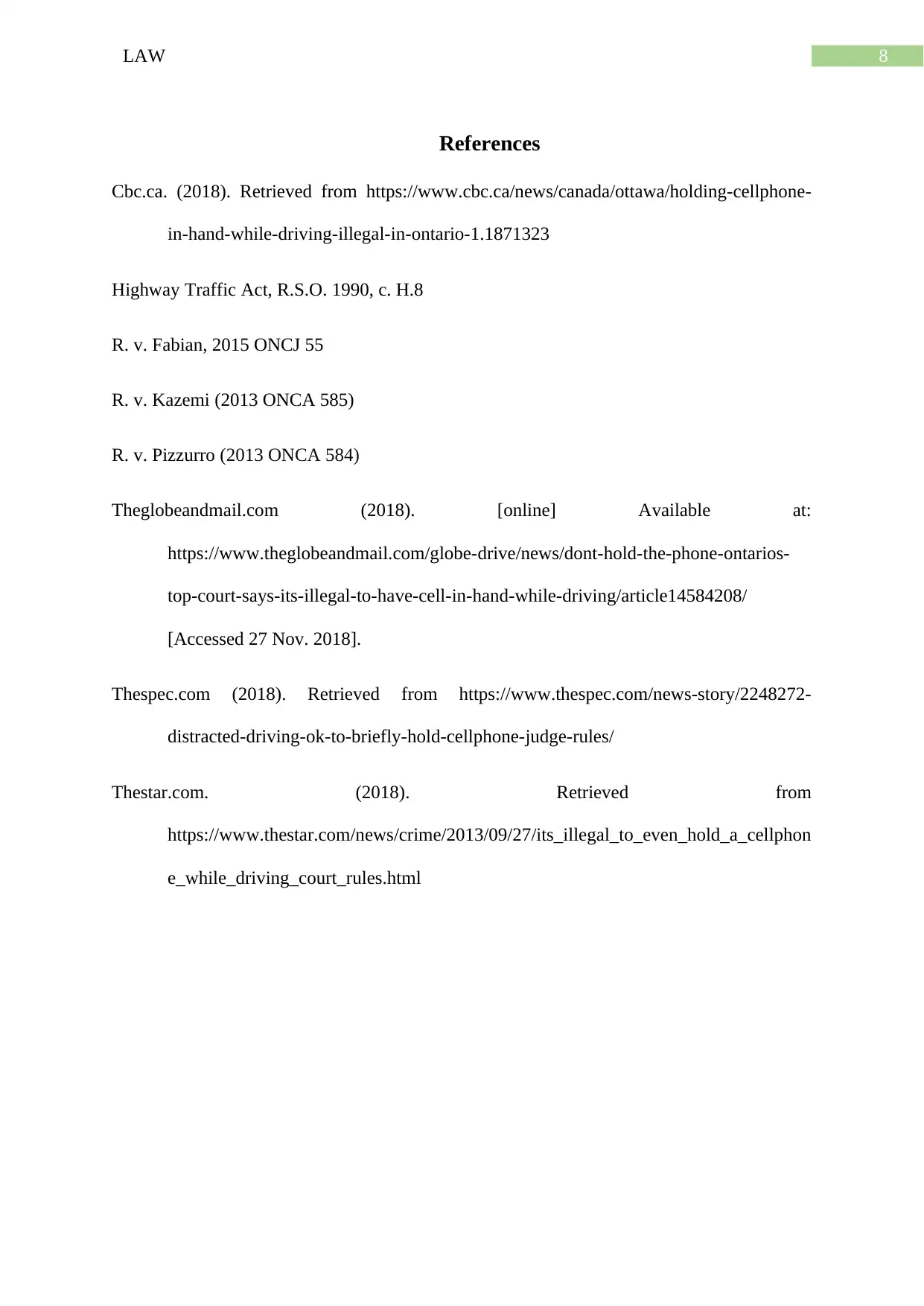
8LAW
References
Cbc.ca. (2018). Retrieved from https://www.cbc.ca/news/canada/ottawa/holding-cellphone-
in-hand-while-driving-illegal-in-ontario-1.1871323
Highway Traffic Act, R.S.O. 1990, c. H.8
R. v. Fabian, 2015 ONCJ 55
R. v. Kazemi (2013 ONCA 585)
R. v. Pizzurro (2013 ONCA 584)
Theglobeandmail.com (2018). [online] Available at:
https://www.theglobeandmail.com/globe-drive/news/dont-hold-the-phone-ontarios-
top-court-says-its-illegal-to-have-cell-in-hand-while-driving/article14584208/
[Accessed 27 Nov. 2018].
Thespec.com (2018). Retrieved from https://www.thespec.com/news-story/2248272-
distracted-driving-ok-to-briefly-hold-cellphone-judge-rules/
Thestar.com. (2018). Retrieved from
https://www.thestar.com/news/crime/2013/09/27/its_illegal_to_even_hold_a_cellphon
e_while_driving_court_rules.html
References
Cbc.ca. (2018). Retrieved from https://www.cbc.ca/news/canada/ottawa/holding-cellphone-
in-hand-while-driving-illegal-in-ontario-1.1871323
Highway Traffic Act, R.S.O. 1990, c. H.8
R. v. Fabian, 2015 ONCJ 55
R. v. Kazemi (2013 ONCA 585)
R. v. Pizzurro (2013 ONCA 584)
Theglobeandmail.com (2018). [online] Available at:
https://www.theglobeandmail.com/globe-drive/news/dont-hold-the-phone-ontarios-
top-court-says-its-illegal-to-have-cell-in-hand-while-driving/article14584208/
[Accessed 27 Nov. 2018].
Thespec.com (2018). Retrieved from https://www.thespec.com/news-story/2248272-
distracted-driving-ok-to-briefly-hold-cellphone-judge-rules/
Thestar.com. (2018). Retrieved from
https://www.thestar.com/news/crime/2013/09/27/its_illegal_to_even_hold_a_cellphon
e_while_driving_court_rules.html
⊘ This is a preview!⊘
Do you want full access?
Subscribe today to unlock all pages.

Trusted by 1+ million students worldwide
1 out of 9
Your All-in-One AI-Powered Toolkit for Academic Success.
+13062052269
info@desklib.com
Available 24*7 on WhatsApp / Email
![[object Object]](/_next/static/media/star-bottom.7253800d.svg)
Unlock your academic potential
Copyright © 2020–2026 A2Z Services. All Rights Reserved. Developed and managed by ZUCOL.